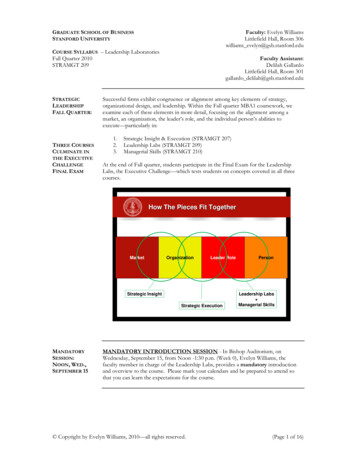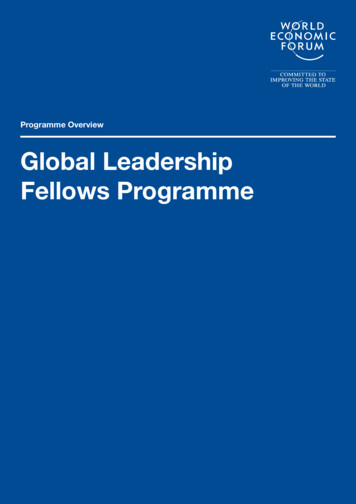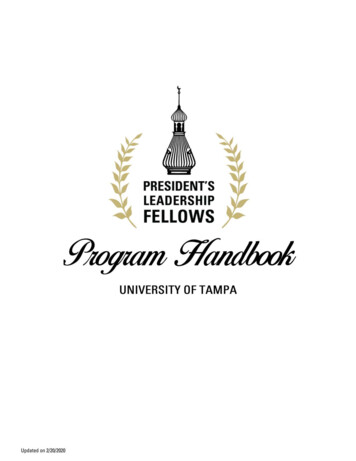
Transcription
PRESIDENT'SLEADERSHIPFELLOWSProgram HandbookUNIVERSITY OF TAMPAUpdated on 2/20/2020
Table of ContentsTable of Contents .2Program Overview . .3Mission Statement. .3Vision .3The University of Tampa's Leadership Definition .3Social Change Model of Leadership Development .4Annual Learning Outcomes .5Year One - Self .5Year Two- Team .6Year Three - Community and Change .7Year Four- Leadership in a Global Society .7Program Expectations .8Leadership Studies Minor .9LED 200: Introduction to Leadership Studies .9LED 099: Experiences in Leadership Studies .9LED 450: Capstone in Leadership Studies . 10Engage UT . 10Tracking Completion of Program Criteria . 10Standing Letters . 10Probation . 11Semester Away from UT . 11Courses that Conflict with PLF . 12Community Meetings & Workshops . 12Community Service and the Social Change Project . 13Community vs. Campus Service Hours . 13Social Change Project . 14Social Change Project Exploration (SCP Exploration) . 14Implementing the Project . 14Making a Lasting Mark with the SCP . 142
Program OverviewThe President's Leadership Fellows (PLF) program is an intensive four-year leadership scholarship programlaunched in Fall 2008. Its name reflects the President's commitment to leadership development and the prestigeof the program. With only 30 freshman selected to participate each year, we hope to identify the incomingstudents with the greatest passion and potential for leadership focused on creating positive social change.Fellows move through each year of the program as a cohort. A cohort is a group- in this case the group ofstudents who start in the program as freshman with you. Each cohort is given a number based on the number ofyears the program has been running . Since this is a four-year program, there are four cohorts in the program ata time. All four cohorts make up the PLF community.PLF's leadership philosophy is congruent with UT's definition of leadership and is theoretically grounded in theSocial Change Model for Leadership Development (HERI, 1996).Mission StatementThe President's Leadership Fellows aims to empower fellows to develop as ethical, responsible, andcollaborative leaders who positively impact the local and global community.VisionTo cultivate ethical leaders who are individually, communally, and globally-minded and who work towardpositive social change .The University of Tampa's Leadership DefinitionLeadership is a process engaged in by responsible citizens in influence relationships who share a commonpurpose of transformational change. The following are our assumptions about leadership: 3Leadership is an active, inclusive and collaborative process. It does not require that one be in a position of formalauthority. Therefore, any responsible citizen can engage in leadership.Leadership creates transformational change. The needed change is identified mutually by all stakeholders in theissue - and all have the opportunity to participate in the process of change. It addresses a systemic social,cultural, or organizational issue.Leadership is a developmental process.Leadership is engaged in by responsible citizens. This implies that there is an ethical dimension to leadership, andthat leaders must be individuals with character and integrity.Leadership is relational. It happens in the space between people -this is where we develop trust, respect, acommon purpose, engage in controversy with civility, and share power. Leadership often happens ingroups/teams of people.Those participating in leadership use influence to create change. Influence can come in the form of formal orinformal authority- but is often most effective when informal authority is utilized.Leadership of this nature necessitates that groups/teams develop a common purpose.Leadership is best learned through experience.
Social Change Model of Leadership DevelopmentThe Social Change Model of Leadership Development was developed at the Higher Education Research Instituteat the University of California, Los Angeles (1994). The model outlines the "EIGHT C's" of leadership. Each "C"recognizes an important component of what every leader should encompass. The "EIGHT C's" are as follows :Group ValuesCollaborationCommon PurposeControversy with CivilityChangeConsciousness of SelfCongruence eCommitmentCitizenshipIndividual ValuesSociety / Community ValuesAdapted from: Cilente, K. (2009). An overview of the social change model of leadership development. In S. R. Komives, & W. Wagner (Eds.). (2009).Leadership tor a better world : Understanding the social change model of leadership development (2nd Ed). San Francisco, CA: Jossey-Bass. pp. 52.This model of leadership development recognizes that a "leader is not necessarily a person who holds someformal position or leadership or who is perceived as a leader by others. Rather, we regard a leader as one whois able to effect positive social change for the betterment of others, the community, and society. All people, inother words, are potential leaders. Moreover, the process of leadership cannot be described simply in terms ofthe behavior of an individual; rather leadership involves collaborative relationships that lead to collective actiongrounded in the shared values of people who work together to effect positive change" (Astin, 1996, p. 16).It is our hope that by the end of your four years in PLF you will intellectually understand this definition and itsassumptions, as well as embody it and the Social Change Model in your own leadership practice . To supportand challenge you on this journey, we have intentionally designed a program that blends opportunities to learnabout leadership, opportunities to practice leadership, and opportunities to reflect on what you have learnedand practiced to help you deepen and refine your learning and practice.Each year focuses on a different aspect of leadership: self, team, community and change, and leadership in aglobal society. The curriculum is designed so that the workshops build upon one another. This means that youwill continually be asked to apply what you have already learned to what you are currently learning. You will bechallenged to do this in multiple contexts including workshops, community meetings, community service,journals, etc.4
Annual Learning OutcomesHere is a quick overview of the program:YEAR 11YEARYEAR 22YEARYEAR3YEAR3YEAR 44YEARSELFSELFTEAMTEAMCOMMUNITY ANDANDCOMMUNITYCHANGECHANGELEADERSHIP ININ AALEADERSHIPGLOBAL SOCIETYSOCIETYGLOBALSemester 2Semester 3Semester 4LED 200 andRetreatLED ElectiveLED ElectiveLED lvementInvolved in 23 orgs.30 hours ofinvolvement30 hours ofinvolvement30 hours ofinvolvement8 IndividualVolunteerHours8 tProposalCourse andRetreatSemester 1Semester 5Semester 6Semester 7Semester 8MonthlyMonthly SocialChangeProjectReflections1 ReflectiveJournalJournal tofulfill MinorMentoringPaired with Year 2 for 3 meetings a semester-Journal tofulfill Minor--LED 450 einvolvement-ProjectProject ImplementationImplementation-Journal tofulfill Minor-Mentor Year 1. Paired with UTStaff for 3 meetings-1 ReflectiveJournal1 ReflectiveJournal1 meetingmeeting aasemestersemester withwith1 person inin dreamdream careercareeraaperson--Transition out of leadershiproles-ProjectWrap-Up &PresentationClosing theLoop on theProject1 ReflectiveJournalFinalReflectionPresentation--1 meetingmeeting aasemestersemester withwith1 person inin dreamdream careercareeraapersonAt the foundation of PLF, are intentional learning outcomes informed by the SCM and UT's Spartan ReadyCompetencies. Learning outcomes describe what we hope you will have learned at the end of each year throughyour engagement in the learning activities. What follows is the focus, learning outcomes, and the requiredlearning activities for each year.Year One - SelfLeadership demands that one be continually self-aware. Mindfulness of one's thoughts and feelings, as well asknowledge of strengths and weaknesses gives leaders the foundation necessary to: enhance their relationshipswith diverse others, be open to multiple perspectives, create strong teams, and engage in critical and sustainedreflection .Learning Outcomes for Year One:By the end of year one, students who participate in the President's Leadership Fellows program will be able to: 5recognize the importance of understanding oneselfidentify and deconstruct their individual strengthsarticulate their personal values and how these shape the practice of ethical leadershipreflect on the people and experiences that shaped their understanding of leadership, motivation to lead,and areas for personal growthdefine congruence, how to achieve it, and identify obstacles to overcome incongruencedescribe and examine their own cultural heritage, values and beliefsillustrate at least four current leadership theories
recall the eight elements of the Social Change Modelset individuals goals for the President's Leadership Fellows programLearning Activities/Program Criteria for Year One : Complete LED 200: Introduction to Leadership Studies in FallParticipate in a weekend leadership retreat in the FallAttend monthly cross-cohort community meetingsAttend the cohort-based workshops in the SpringMeet with the program advisor once a yearMeet three times a semester with your peer mentorActively participate in at least one Open House and/or Fly-In recruitment eventDeclare the Leadership Studies Minor in the FallActively participate in 2-3 student organizations of your choosingComplete eight hours of off-campus community service each semesterComplete one reflective journal each semesterYear Two - TeamDeveloping common purpose and working collaboratively with diverse others are important skills for today'sglobal leaders. Year two focuses on applying the self-awareness learned in year one to team life and ondeveloping the type of relationships that will ultimately enhance a group's capacity to solve the complexproblems leaders face .Learning Outcomes for Year Two:By the end of year two, students who participate in the President's Leadership Fellows program will be able to: prepare a Social Change Project (SCP) proposal to create positive social changearticulate a shared, common vision for their SCPwork with others to integrate information about community concerns into the SCPpresent on potential social change projects for a specific populationperform an exploration of the non-profit organization and/or specific populationeffectively collaborate with others to complete the challenge course obstaclesengage in meaningful dialogue and include it in the process of controversyarticulate the benefits and risks of group conflictmentor a novice PLF student by meeting with student at least six timesLearning Activities/Program Criteria for Year Two: 6Attend all cross-cohort community meetings and cohort-based workshopsMeet three times a semester with your faculty/staff mentorMentor a first-year student in the program and meet with them three times a semesterEnroll in the LED099 elective each semesterComplete at least 30 hours of involvement each semesterMeet once a year with the program advisor
Complete the Social Change Project exploration process in the Fall Prepare and present on the Social Change Project proposal Complete one reflective journal each semesterYear Three - Community and ChangeThe effectiveness of one's leadership practice in organizations, community, and world is often judged by thedegree of positive social change achieved. Now that participants have developed a high degree of self awareness and skill in working in a team -the team will have the chance to create the kind of lasting changeneeded in our communities.Learning Outcomes for Year Three :By the end of year three, students who participate in the President's Leadership Fellows program will be able to: revise and create the action plan for the Social Change Projectarticulate their vision as change agents in their discipline and our broader societydevelop a leadership action plan to analyze and address an adaptive changeanalyze and reflect upon their personal leadership identity in relation to otherscritically interpret leadership theories, including strengths and limitationssynthesize leadership theories into practice in individual, group, and community domainsinterpret the uses of power and nature of oppression in systemic societal issuesform a positive and professional relationship with two chosen mentorspresent on the status of the group Social Change projectLearning Activities/Program Criteria for Year Three: Attend all cross-cohort community meetings and cohort-based workshopsParticipate in a weekend leadership retreat in the SpringComplete the LED 450 Capstone and Leadership Studies MinorMeet once a year with the program advisorMeet once a semester with a mentor in your professional field of interestActively maintain a leadership position within at least one organization on or off-campusActively participate in and implement the Social Change ProjectComplete one reflective journal each semesterYear Four - Leadership in a Global SocietyJust as the leadership culture is different for different types of organizations (e.g., leadership looks and feelsdifferent in a corporate setting than in an educational environment), it also varies on a global level based on thehistory, norms, and values of a particular culture. Therefore, the focus in year four is two-fold. The first is toexamine how leadership is practiced in one's chosen professional field, while concurrently learning about therelationship between societal culture and organizational leadership in other countries.Learning Outcomes for Year Four:By the end of year four, students who participate in the President's Leadership Fellows program will be able to:7
successfully complete the Social Change Project in accordance to group's action planpresent on and critique the Social Change Project experience and outcomejustify and defend their stance on human rights and civic responsibility in their final presentationunderstand the how their experience at UT translates to success in their chosen professioncreate a sustainability plan for the Social Change Projectassess their own development throughout the PLF programform a positive and professional relationship with two chosen mentorsformulate a plan for remaining an active global leader post-graduationevaluate and critique the PLF programLearning Activities/Program Criteria for Year Four: Attend all cross-cohort community meetings and cohort-based workshopsMeet once a year with the program advisorMeet once a semester with a mentor in your professional field of interestComplete a PLF Senior experienceCreate a sustainability plan for the Social Change ProjectPresent on your Social Change Project and your experience in the PLF programComplete one reflective journal each semesterProgram ExpectationsThe President's Leadership Fellows program is a prestigious scholarship program at The University of Tampa.To maintain your annual 1,000 scholarship and participation in the program, program expectations must be met.Upon your acceptance into the program, you signed and returned a contract to the program advisor that read (inpart):The President's Leadership Fellows at The University of Tampa are dedicated to personal and academic excellence in addition to the development ofleadership skills. Choosing to become a part of the Leadership Fellows program obligates each member to an honorable code of conduct. I recognizethat my involvement is a privilege and as such my responsibilities will be held in the highest regards at all times.As a Leadership Fellow I will : Practice personal and academic integrity;Respect the dignity of all persons;Willingly serve the community to the best of my ability;Promote leadership through participation in activities and organizations on campus;Strive to learn from differences in people, ideas, opinions, and discourage prejudice;Demonstrate concern for others and their need for conditions which support their academic progress and personal development;Commit to actively participating in all four years of the President's Leadership Fellow's program;Complete all program criteria;Maintain a minimum of a 3.0 cumulative GPA;Remain in good standing with the Office of Student Conduct and Office of Residence Life .Your signed contract is always available for your review in the program advisor's office.You will notice that many of these expectations are broad, and encompass much more than the simplecompletion of all program criteria (although by completion of all program criteria, we do meanThis ispurposeful. As you know from watching TV, reading tweets, and checking Facebook and/or Instagram, leadersam.8
in the 2l8t century are judged on what happens privately/personally as much as they are judged on what theyaccomplish publically/professionally. It is our philosophy that we would be doing you a disservice if we did nothold you to the same expectations at The University of Tampa as you will be held to in life.Leadership Studies MinorAll Fellows are required to minor in Leadership Studies along with their cohort. Fellows may also take onadditional minors - in fact many students do just that.Below are the degree requirements and course progression:- YEAR 11YEARYEAR 22YEARYEAR 33YEARFallSemester 1SpringSemester 2FallSemester 3SpringSemester4FallSemester 5LED 200LED 099LED 099LED 099LED 450(4 credits)(0 credits)(0 credits)(0 credits)(4 credits)SpringSemester6LED 200: Introduction to Leadership StudiesOnce students accept their invitation to become a President's Leadership Fellow, they will be registered in LED200: Introduction to Leadership Studies (4 credit course) along with all their cohortmates. This in an experientialcourse and includes an overview of leadership theories and examining leadership from individual, group,organizational and global perspectives. The course will demonstrate the interrelatedness of an individual withthe community/organization and the skills necessary for leading in a global society.During their first semester at UT, Fellows will declare the Leadership Studies Minor.LED 099: Experiences in Leadership StudiesFor the next 3 semesters, fellows must register for the minor elective, LED 099: Experiences in LeadershipStudies. Since these courses are zero credits, they is no additional costs to students.The requirements for LED 099 are embedded into the PLF program. To complete these three elective courses,Fellows will :1. Meet with the program advisor at the beginning of Semesters 2, 3 and 4 and define their LED partnercourse and 30-hour involvement experience.a. Select a 4 to 6-credit course Fellows are taking that semester that ties into the topic ofLeadership Studies (i.e. a speech and communications course where a student develops certain leadership skills; a Biologycourse where the student works in several team assignments; or a women studies course examining the role of women in societyCourses must be taken with prefixes from more than one college .b. Select from one to three involvement opportunities each semester. Fellow will select experienceswhere they dedicate over 30 hours that semester to their leadership development (i.e participating inand critical feminist theory).an engaging seminar, volunteer work, internships, off-campus involvement, and holding leadership roles in student organizations) .Over these three semesters, Fellows must acquire 90 involvement hours to complete the minorrequirements.2. Submit their LED 099 journal reflection for PLF at the end of Semesters 2, 3 and 4.9
a. Fellows registered in LED 099 will receive a prompt to reflect on the course they selected, the 30hours of involvement, and how these experiences connect to their development as a sociallyresponsible leader.3. Register for LED 099 each of the three semesters (Spring of their pt year and Fall & Spring of their 2ndyear at UT).LED 450: Capstone in Leadership StudiesDuring their 6th semester at UT, Fellows will register and complete LED 450: Capstone in Leadership Studies as acohort. Fellows must plan to take this course with their cohort that Spring in order to complete the LeadershipStudies Minor and the PLF requirements . This 4-credit course will be offered on Fridays afternoon for a 3-hourperiod .Engage UTPLF uses Engage UT as a platform to share information about important dates, to track completion of programrequirements, to share documents relevant to the program, and to facilitate communication with one another.The program advisor will enroll you in the organization. If you do not see "President's Leadership Fellows" in thelist under Organizations, please let the program advisor know immediately. Here is some guidance on what youcan find where .Community service hours, mentoring, GPA, and conduct checks will not be done until the end of the semesterand will be tracked at that time.Tracking Completion of Program CriteriaCompletion of program criteria including attendance at workshops, community meetings, and journals aretracked by the program advisor and the Student Coordinators of PLF. Please check with the StudentCoordinators regularly to ensure its accuracy.Since the workshops and community meeting are the glue of the program, you are only allowed one excusedabsence per semester. A sign-in sheet will be available at each workshop and community meeting. It is yourresponsibility to sign-in to ensure you receive credit for being present.At the start of each semester you have a mentor, print the Mentor Report Form off Engage UT (located under the"Forms" tab). It is your responsibility to take this to each meeting with your mentor and have them sign it. Pleaseturn these in to the program advisor no later than the last day of classes each semester.At the end of each semester, the program advisor will work with the appropriate offices to check yourcommunity service hours, GPA and conduct record .Standing LettersAt the end of each semester, the program advisor will verify that you have completed all program criteria,maintained a cumulative 3.0 GPA, and are in good standing with the Office of Student Conduct and Office ofResidence Life. During the start of the new semester, you will receive a standing letter. If you have successfully10
completed all program criteria, the letter will verify that and you will be able to maintain your scholarship foranother semester.If you did not meet all program criteria, it will list which criteria you failed to achieve and advise you if you are onprobation, or if you are no longer eligible to participate in program. Additionally, if you are on probation, yourstanding letter will notify you of what you need to do to come off probation the following semester.ProbationThe probation system provides Fellows with the opportunity to learn from their mistakes.Probation lasts for one semester. A Fellow may be on probation up to three times throughout the course of thefour-year (eight-semester) program. However, a Fellow may not be on probation two semesters in a row.To come off probation, the Fellow must successfully complete all program requirements listed below: Community Meetings and Workshops: Attend all community meetings and cohort workshops.Community Service: If you fail to complete the required number of service hours for each semester, youwill be asked to complete double the number of hours you were short. For example, if you needed onemore hour to successfully complete the requirement, you would be asked to complete two hours inaddition to the requirement for successful completion the semester you are on probation .GPA: If you do not maintain the minimum cumulative GPA of a 3.0, you will be asked to set up a meetingwith the program advisor. During that meeting you will discuss your academic progress, study habits,time commitments, etc . and put together a comprehensive academic plan (which may include meetingregularly with your professors, securing a tutor, etc.) to ensure you are able to raise your GPA to meetthe minimum requirement the following semester.Mentoring: If you do not have the minimum number of meetings with your mentor you will be asked tocomplete the additional number of meetings with you mentor in the following semester.Conduct Check: If you are not in good standing with either the Office of Student Conduct or the Office ofResidence Life you may be put on probation . It is up to the President's Leadership Fellows programadvisor to make this determination, and to decide what your additional requirements should be.Semester Away from UTOne of the most frequently asked questions about PLF is, "can I study abroad and still maintain my PLFscholarship?" It depends on the program and is determined on a case-by-case basis, but more often than notwe are able to turn this possibility into a reality. The same is true for a University of Tampa approved internshipfor which you are receiving academic credit.Philosophically, both experiences have the potential to support the intended learning outcomes of thePresident's Leadership Fellows program, and are encouraged .In most cases, you will be able to maintain your scholarship while studying abroad or completing a UT-approvedinternship if: 11You are in good standing (e.g., not on probation) the semester you will be away;You will be gone no longer than one semester;
You are receiving academic credit through UT for your experience;You are willing to engage in other activities while away that reflect the uniqueness of your tripabroad/internship and that facilitates the learning you will miss in the program.It is your responsibility to meet with the program advisor the semester before you will be
The President's Leadership Fellows (PLF) program is an intensive four-year leadership scholarship program . Each year focuses on a different aspect of leadership: self, team, community and change, and leadership in a global society. The curriculum is designed so that the workshops build upon one another. This means that you
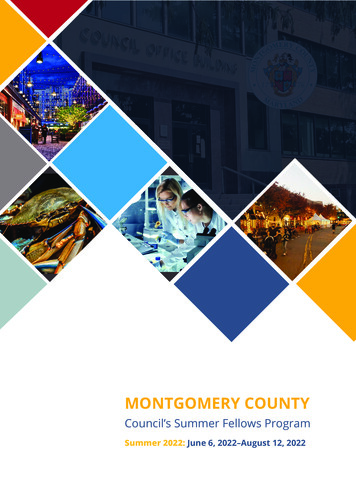



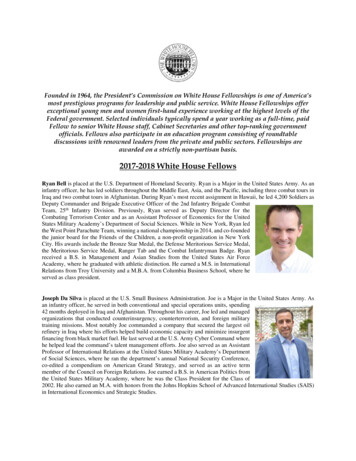
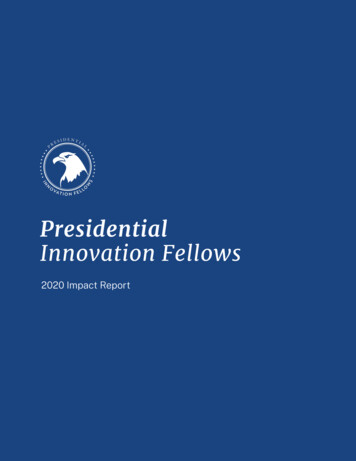


![WELCOME [ montclair.edu]](/img/31/commencement-program-2022.jpg)
